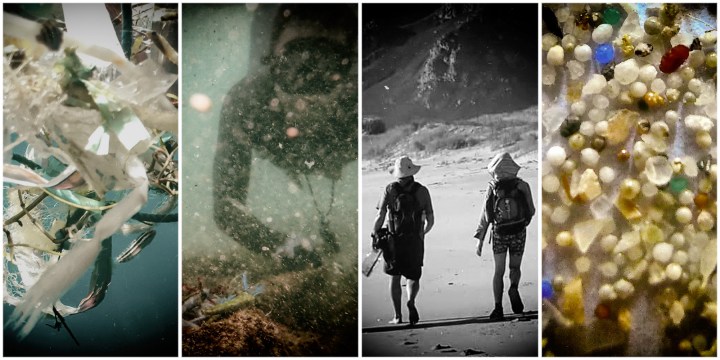SEA CHANGE
Plastic waste polluting South Africa’s oceans needs answers from bright young minds

Eco-volunteers group Strandloper Project is running a competition for engineers and designers to come up with ways of reducing the amount of plastic pollution that finds its way into the sea.
The Strandloper Project, based in Sedgefield, Western Cape, is running a competition for aspiring “ocean heroes” — young engineers and designers — to devise a solution that will turn the tide on plastic pollution that ends up in the oceans.
Organisers of the competition hope to find the best design for a self-flushing interceptor of plastic debris, suitable for placement at stormwater drain outlets.
Strandloper Project coordinator Kim de Jager said that while the challenge is open to all, it’s directed primarily at tertiary-level engineering students in South Africa.
“Given the widespread public concern over ocean plastic pollution and the global reach of the problem, we believe that the current focus on the international plastics treaty will form a compelling backdrop against which to showcase the competition,” he said.
In February, Daily Maverick reported that the Cabinet adopted a draft resolution on plastic pollution in light of the detrimental effect the fossil fuel byproduct poses to the environment.
The draft resolution is a call for a legally binding global agreement on plastics. It seeks to address the waste management of plastic, the circular approach of the material while recognising its effects on marine life, and the fact that plastic pollution is a transboundary issue.
About 14 million tonnes of plastic infiltrate marine ecosystems every year, flowing into lakes, rivers and oceans. Often this plastic is ingested by marine animals. At times, the microplastics eaten by fish and other creatures are in turn eaten by humans, posing a further health risk.
Almost 80,000 tonnes of plastic leak into the oceans and rivers of South Africa each year, making up 3% of the plastic waste generated annually in the country. About 2.4 million tonnes of plastic waste is generated in South Africa each year. From that, 70% is collected, but just 14% of it (including imported waste) is recycled.
Fannie Masemola to carry ‘the weight of the nation’s expectation’ as SA’s new police boss
Earlier this month, a legally binding draft treaty to end plastic pollution, titled “End Plastic Pollution: Towards an Internationally Legally Binding Instrument”, was adopted at the fifth session of the UN Environment Assembly held in Nairobi, Kenya.
De Jager said existing solutions for stormwater systems play an important part in capturing pollutants in coastal areas in parts of South Africa, but the collection bags must be emptied regularly, especially in high-flow conditions.
“Flooding increases the risk of system failure, as well as the danger of injury to the operator,” he said.
De Jager said the design that wins the Strandloper Project’s competition will be the one that intercepts plastic debris at the outlet of stormwater drains and diverts it from the flow of the water, making it safe and simple to empty, even in flood conditions.
“This will also reduce the risk of plastic escaping the system and reaching the ocean,” said De Jager.
Of the 300 million tonnes of plastic waste produced worldwide every year, 14 million tonnes end up in the oceans, according to the World Wildlife Fund.
“Most of this ocean plastic has its origins on land and is washed into the sea where it lasts indefinitely, negatively impacting marine life through ingestion, entanglement and poisoning,” De Jager said.
In October last year, eco-volunteers from the Strandloper Project embarked on an expedition to collect data about the types and origins of plastic pollution along the southern shoreline of South Africa.
The 165km hike from Arniston to Hermanus was part of their third coastal research expedition.
The project’s leader, Mark Dixon, said that in previous expeditions they had recorded valuable information about plastic pollution and washed-up fishing debris, using six survey methods captured in an app called CyberTracker.
“From the previous two expeditions we have been able to demonstrate that over 90% of plastic pollution in the Southern Cape, especially microplastics, are from inland sources, flowing down rivers and through municipal infrastructure like stormwater drains and effluent outlets, into the ocean,” Dixon said
Entries for the competition close on 28 April. Shortlisted designers will be announced on 7 May, with the winner announced on 4 June. Details of the competition can be found here: www.strandloperproject.org/competition.html DM/OBP
[hearken id=”daily-maverick/9303″]




















Comments - Please login in order to comment.